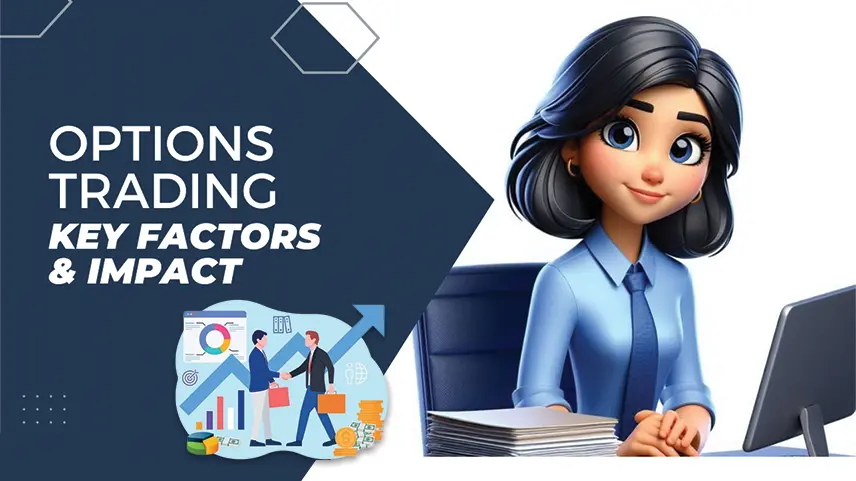Options Pricing - Key Factors & Impact
An Option premium price is the price that trader needs to pay to buy a put or call options contract. Before starting the trading in option should have a good understanding of option pricing and several factors that effects the value of an option.

Option’s premium is influenced by following factors:
• Price of the underlying market
• Volatility
• Option expiry time
• Rates of interest
Explanation of Option Pricing
Option pricing can be defined as the amount per share you need to pay to trade an option. Option price is also known as premium. The buyer has right to buy an option by paying the premium amount to the seller to earn the rights granted by the option. Option premium are the price allotted per share. Every option is available in lots of shares known as lot size; you need to pay to buy an option.
Premium Amount Calculation
Total premium amount= (lot size) *(premium price per share)
For example, say RELIANCE option with a strike price of Rs 1,500 is available at a premium of Rs 50 per share for a lot size of 100 shares. To buy the option, you need to pay a premium amount of Rs 50*100= Rs 5000.
Factors determining an Option’s Price or Premium
1. Option’s underlying asset’s value
As we know, options are derived from underlying instruments (stocks) like Gold, Silver, Currency etc. The value of the instruments(stocks) from which options are derived has the direct effect on the call or put option prices. If the underlying stocks price increases, then the option price also increases and if the underlying stocks price decreases, then the option price also decreases. But the movement in options is very slow then the underlying stocks.
2. Intrinsic value
Intrinsic value can be defined as the value of the option if it were exercised today. It can be calculated as the difference between the price of the underlying stocks and the strike price.
The strike price is the price at which a buyer or a seller decided to enter the contract.
Intrinsic value of call options can be calculated as-
Intrinsic Value = Spot price- Strike price
Intrinsic value of put options can be calculated as
Intrinsic Value = Strike price- Spot price
Intrinsic value of an option can never be negative it can be zero or positive.
3. Option’s Time value (Expiry time)
It is the difference between premium and intrinsic value.
Time value = Premium price- Intrinsic value
Time value is known as how much time an option has until its expiry date. Long expiry time/expiry date, the higher is the premium. Premium price decreases as its expiry date come closer.
4. Volatility
The word volatility is defined as how sudden the price of stocks increases or decreases over a particular period. Volatility has the direct impact on the premium. If there is high volatility then there is a chance that investors can get good profit in short time.
Volatility has two types- historical or implied.
5. Interest Rate
There is not any direct impact of interest rate on option pricing. Normally it has nominal influence on option pricing.
6. Dividends on underlying stocks
Dividends gives you an effective way to earn income from your equity investments. Not all companies pay dividends, but want to invest in options for do pay them followings things you need to keep in mind.
• Declaration date
• Record date
• Ex-Dividend date
• Payment date
Factors affecting call option price and put option price
Factors Affecting Option Premium | Effect on Call Option Price | Effect on Put Option Price |
Increase in the value of the underlying stock | Increase | Decrease |
Intrinsic value increases | Decrease | Increase |
Time Value increases | Increase | Increase |
Volatility increases | Increase | Increase |
Interest rates increases | Increase | Decrease |
Dividends increases | Decrease | Increase |
Also Read: Options Trading Strategies

0 comments